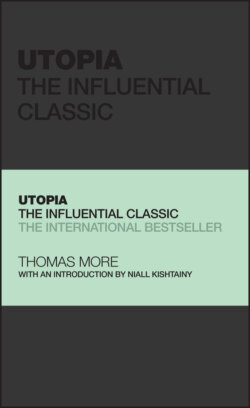Читать книгу Utopia - Sir Thomas More, Thomas More, William Roper - Страница 12
A UTOPIAN IN TUDOR ENGLAND
ОглавлениеIt was an auspicious time for a man of More's interests and background to enter royal service. The question of Henry's divorce that would later lead to Wolsey's fall and to More's execution had yet to dominate English politics. The civil wars known as the Wars of the Roses had ended in the late fifteenth century when More was still a boy. The Tudors had come to power, putting the English nation state on a more stable footing.
With European explorers discovering and plundering new lands, international trade routes were opening up and England was becoming an important trading power and London a major commercial hub. When Henry VIII took the throne in 1509, More wrote verses hailing the dawn of a new era of prosperity and justice. Henry was himself a scholar, and a new breed of learned courtiers began to emerge, like More drawn from middling social ranks and trained in the law.
More and many of his friends at court were connected to the Christian humanist scholarship that had originated in Renaissance Italy and spread to Northern Europe during the fifteenth century. Its exponents returned to original Greek and Latin texts, revived classical rhetoric that would give new ideas practical as well as intellectual potency, and rejected the abstract logical methods of medieval scholastic philosophy. More and other humanist scholars believed that the renovation of literary scholarship would promote human virtue, a purer form of Christianity, and a better society. Erasmus and More were leading lights of this movement and forged a famous friendship and intellectual partnership. Helped through publication by Giles and Erasmus, Utopia was one of the most famous literary creations of this new cultural setting.
Thomas Wolsey epitomized the opulence and worldly ambition of the court that More deplored, but he was a champion of the new learning and was promoting policies that would find parallels in Utopia. Wolsey attempted to reform the inefficient and sclerotic English legal system, which had long disadvantaged the poor. In 1517, he established a commission on the enclosure of common land, then illegal, and attempted to prosecute those undertaking such practices.
When More became Lord Chancellor in 1529, he continued Wolsey's legal efforts to make the law swifter and more accessible to the poor. More may even have considered dedicating Utopia to Wolsey, and it has been conjectured that the book inspired Wolsey to set up his enclosure inquiry. It is hard to draw precise connections between Wolsey's and More's actual policies and the new forms of society set out in Utopia. However, the echoes of one in the other are another reason for believing that More might have been less conflicted about entering royal service than many of his biographers have assumed.
Another echo of Utopia in More's life is found in the reputation of his family as having been especially learned and virtuous. More had four children by his first wife, Jane Colt, who died in her early twenties; his second wife, the well‐off Alice Middleton, acted as stepmother and stayed with him until his death. The family followed a routine of prayer and study and all were encouraged in cultural pursuits. More's children were carefully educated in the classics and religion and his favourite, Margaret, became one of the most learned women in England. At mealtimes, a religious text would be read out and discussed. Erasmus called the household a Platonic Academy devoted to study and spiritual cultivation. Visiting scholars would come to stay, courtiers pass through, and sometimes even the king would drop in for dinner. More's admirers have thought of his home as a little humanist Utopia, a place of scholarship, Christian virtue, and public duty.
